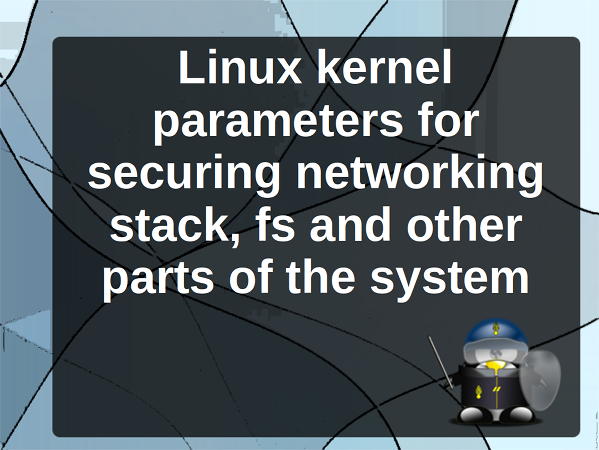
How do I set advanced security options of the TCP/IP stack and virtual memory to improve the security and performance of my Linux based system? How do I configure Linux kernel to prevent certain kinds of attacks using /etc/sysctl.conf? How do I set Linux kernel parameters?
sysctl is an interface that allows you to make changes to a running Linux kernel. With /etc/sysctl.conf you can configure various Linux networking and system settings such as:
- Limit network-transmitted configuration for IPv4
- Limit network-transmitted configuration for IPv6
- Turn on execshield protection
- Prevent against the common ‘syn flood attack’
- Turn on source IP address verification
- Prevents a cracker from using a spoofing attack against the IP address of the server.
- Logs several types of suspicious packets, such as spoofed packets, source-routed packets, and redirects.

Linux Kernel /etc/sysctl.conf Security Hardening with sysctl
The sysctl command is used to modify kernel parameters at runtime. /etc/sysctl.conf is a text file containing sysctl values to be read in and set by sysct at boot time. To view current values, enter:# sysctl -a
# sysctl -A
# sysctl mib
# sysctl net.ipv4.conf.all.rp_filter
# sysctl -a --pattern 'net.ipv4.conf.(eth|wlan)0.arp'
To load settings, enter:# sysctl -p
Sample /etc/sysctl.conf for Linux server hardening
Edit /etc/sysctl.conf or /etc/sysctl.d/99-custom.conf and update it as follows. The file is documented with comments. However, I recommend reading the official Linux kernel sysctl tuning help file (see below):
# The following is suitable for dedicated web server, mail, ftp server etc. # --------------------------------------- # BOOLEAN Values: # a) 0 (zero) - disabled / no / false # b) Non zero - enabled / yes / true # -------------------------------------- # Controls IP packet forwarding net.ipv4.ip_forward = 0 # Do not accept source routing net.ipv4.conf.default.accept_source_route = 0 # Controls the System Request debugging functionality of the kernel kernel.sysrq = 0 # Controls whether core dumps will append the PID to the core filename # Useful for debugging multi-threaded applications kernel.core_uses_pid = 1 # Controls the use of TCP syncookies # Turn on SYN-flood protections net.ipv4.tcp_syncookies = 1 net.ipv4.tcp_synack_retries = 5 ########## IPv4 networking start ############## # Send redirects, if router, but this is just server # So no routing allowed net.ipv4.conf.all.send_redirects = 0 net.ipv4.conf.default.send_redirects = 0 # Accept packets with SRR option? No net.ipv4.conf.all.accept_source_route = 0 # Accept Redirects? No, this is not router net.ipv4.conf.all.accept_redirects = 0 net.ipv4.conf.all.secure_redirects = 0 # Log packets with impossible addresses to kernel log? yes net.ipv4.conf.all.log_martians = 1 net.ipv4.conf.default.accept_source_route = 0 net.ipv4.conf.default.accept_redirects = 0 net.ipv4.conf.default.secure_redirects = 0 # Ignore all ICMP ECHO and TIMESTAMP requests sent to it via broadcast/multicast net.ipv4.icmp_echo_ignore_broadcasts = 1 # Prevent against the common 'syn flood attack' net.ipv4.tcp_syncookies = 1 # Enable source validation by reversed path, as specified in RFC1812 net.ipv4.conf.all.rp_filter = 1 # Controls source route verification net.ipv4.conf.default.rp_filter = 1 ########## IPv6 networking start ############## # Number of Router Solicitations to send until assuming no routers are present. # This is host and not router net.ipv6.conf.default.router_solicitations = 0 # Accept Router Preference in RA? net.ipv6.conf.default.accept_ra_rtr_pref = 0 # Learn Prefix Information in Router Advertisement net.ipv6.conf.default.accept_ra_pinfo = 0 # Setting controls whether the system will accept Hop Limit settings from a router advertisement net.ipv6.conf.default.accept_ra_defrtr = 0 #router advertisements can cause the system to assign a global unicast address to an interface net.ipv6.conf.default.autoconf = 0 #how many neighbor solicitations to send out per address? net.ipv6.conf.default.dad_transmits = 0 # How many global unicast IPv6 addresses can be assigned to each interface? net.ipv6.conf.default.max_addresses = 1 ########## IPv6 networking ends ############## #Enable ExecShield protection #Set value to 1 or 2 (recommended) #kernel.exec-shield = 2 #kernel.randomize_va_space=2 # TCP and memory optimization # increase TCP max buffer size setable using setsockopt() #net.ipv4.tcp_rmem = 4096 87380 8388608 #net.ipv4.tcp_wmem = 4096 87380 8388608 # increase Linux auto tuning TCP buffer limits #net.core.rmem_max = 8388608 #net.core.wmem_max = 8388608 #net.core.netdev_max_backlog = 5000 #net.ipv4.tcp_window_scaling = 1 # increase system file descriptor limit fs.file-max = 65535 #Allow for more PIDs kernel.pid_max = 65536 #Increase system IP port limits net.ipv4.ip_local_port_range = 2000 65000 # RFC 1337 fix net.ipv4.tcp_rfc1337=1 |
Reboot the machine soon after a kernel panic
kernel.panic=10
Addresses of mmap base, heap, stack and VDSO page are randomized
kernel.randomize_va_space=2
Ignore bad ICMP errors
net.ipv4.icmp_ignore_bogus_error_responses=1
Protects against creating or following links under certain conditions
fs.protected_hardlinks=1 fs.protected_symlinks=1
How do I tune Linux VM subsystem?
How do I tune Linux network stack?
Other Linux security tips
References:
